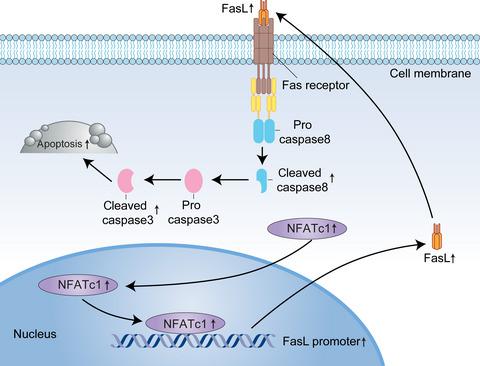当前位置:
X-MOL 学术
›
Cancer Med.
›
论文详情
Our official English website, www.x-mol.net, welcomes your
feedback! (Note: you will need to create a separate account there.)
NFATc1 is a tumor suppressor in hepatocellular carcinoma and induces tumor cell apoptosis by activating the FasL‐mediated extrinsic signaling pathway
Cancer Medicine ( IF 2.9 ) Pub Date : 2018-08-07 , DOI: 10.1002/cam4.1716
Sanrong Xu 1 , Penghao Shu 2 , Song Zou 1 , Xiaofeng Shen 1 , Yuanqian Qu 1 , Yong Zhang 1 , Kang Sun 1 , Jin Zhang 1
Cancer Medicine ( IF 2.9 ) Pub Date : 2018-08-07 , DOI: 10.1002/cam4.1716
Sanrong Xu 1 , Penghao Shu 2 , Song Zou 1 , Xiaofeng Shen 1 , Yuanqian Qu 1 , Yong Zhang 1 , Kang Sun 1 , Jin Zhang 1
Affiliation

|
Nuclear factor of activated T cells (NFAT) is a family of transcription factors that have important functions in many tumors. However, the expression level and functional role of NFAT in hepatocellular carcinoma (HCC) remain unclear. In this study, we showed that NFATc1 expression was decreased in both HCC tissues and cell lines. Low expression of NFATc1 was correlated with larger tumor size, advanced tumor‐node‐metastasis (TNM) stage, high serum AFP level, and liver cirrhosis. Furthermore, patients with low NFATc1 expression exhibited poor prognosis. Ectopic expression of NFATc1 in HCC cells inhibited proliferation and colony formation, leading to G1 arrest and induction of apoptosis. In addition, we demonstrated that NFATc1 increased Fas ligand (FasL) expression by directly binding to its promoter and activated the extrinsic apoptotic pathway. NFATc1 and FasL expression patterns and their prognostic value for patients with HCC were also evaluated in TCGA Liver Hepatocellular Carcinoma database. Knock‐down of FasL expression by siRNA in HCC cell lines abolished NFATc1's antiproliferative and pro‐apoptotic effects. In conclusion, NFATc1 is frequently inactivated in HCC and functions as a tumor suppressor in liver carcinogenesis. Ectopic expression of NFATc1 in HCC cells induces apoptosis by activating the FasL‐mediated extrinsic signaling pathway.
中文翻译:

NFATc1是肝细胞癌的肿瘤抑制因子,并通过激活FasL介导的外在信号传导途径诱导肿瘤细胞凋亡
活化T细胞的核因子(NFAT)是一类转录因子,在许多肿瘤中具有重要功能。但是,尚不清楚NFAT在肝细胞癌(HCC)中的表达水平和功能作用。在这项研究中,我们表明在肝癌组织和细胞系中NFATc1表达均降低。NFATc1的低表达与更大的肿瘤大小,晚期肿瘤淋巴结转移(TNM)分期,高血清AFP水平和肝硬化相关。此外,NFATc1表达低的患者预后较差。NFATc1在HCC细胞中的异位表达抑制增殖和集落形成,导致G1阻滞并诱导凋亡。此外,我们证明NFATc1通过直接与其启动子结合并激活外在凋亡途径来增加Fas配体(FasL)的表达。还在TCGA肝肝细胞癌数据库中评估了NFATc1和FasL表达模式及其对HCC患者的预后价值。siRNA在HCC细胞系中抑制FasL表达消除了NFATc1的抗增殖和促凋亡作用。总之,NFATc1在肝癌中经常失活,并在肝癌的发生中起着抑癌作用。NFATc1在HCC细胞中的异位表达通过激活FasL介导的外在信号传导途径诱导凋亡。NFATc1在HCC中经常失活,并在肝癌发生中起肿瘤抑制作用。NFATc1在HCC细胞中的异位表达通过激活FasL介导的外在信号传导途径诱导凋亡。NFATc1在HCC中经常失活,并在肝癌发生中起肿瘤抑制作用。NFATc1在HCC细胞中的异位表达通过激活FasL介导的外在信号传导途径诱导凋亡。
更新日期:2018-09-17
中文翻译:

NFATc1是肝细胞癌的肿瘤抑制因子,并通过激活FasL介导的外在信号传导途径诱导肿瘤细胞凋亡
活化T细胞的核因子(NFAT)是一类转录因子,在许多肿瘤中具有重要功能。但是,尚不清楚NFAT在肝细胞癌(HCC)中的表达水平和功能作用。在这项研究中,我们表明在肝癌组织和细胞系中NFATc1表达均降低。NFATc1的低表达与更大的肿瘤大小,晚期肿瘤淋巴结转移(TNM)分期,高血清AFP水平和肝硬化相关。此外,NFATc1表达低的患者预后较差。NFATc1在HCC细胞中的异位表达抑制增殖和集落形成,导致G1阻滞并诱导凋亡。此外,我们证明NFATc1通过直接与其启动子结合并激活外在凋亡途径来增加Fas配体(FasL)的表达。还在TCGA肝肝细胞癌数据库中评估了NFATc1和FasL表达模式及其对HCC患者的预后价值。siRNA在HCC细胞系中抑制FasL表达消除了NFATc1的抗增殖和促凋亡作用。总之,NFATc1在肝癌中经常失活,并在肝癌的发生中起着抑癌作用。NFATc1在HCC细胞中的异位表达通过激活FasL介导的外在信号传导途径诱导凋亡。NFATc1在HCC中经常失活,并在肝癌发生中起肿瘤抑制作用。NFATc1在HCC细胞中的异位表达通过激活FasL介导的外在信号传导途径诱导凋亡。NFATc1在HCC中经常失活,并在肝癌发生中起肿瘤抑制作用。NFATc1在HCC细胞中的异位表达通过激活FasL介导的外在信号传导途径诱导凋亡。

































 京公网安备 11010802027423号
京公网安备 11010802027423号